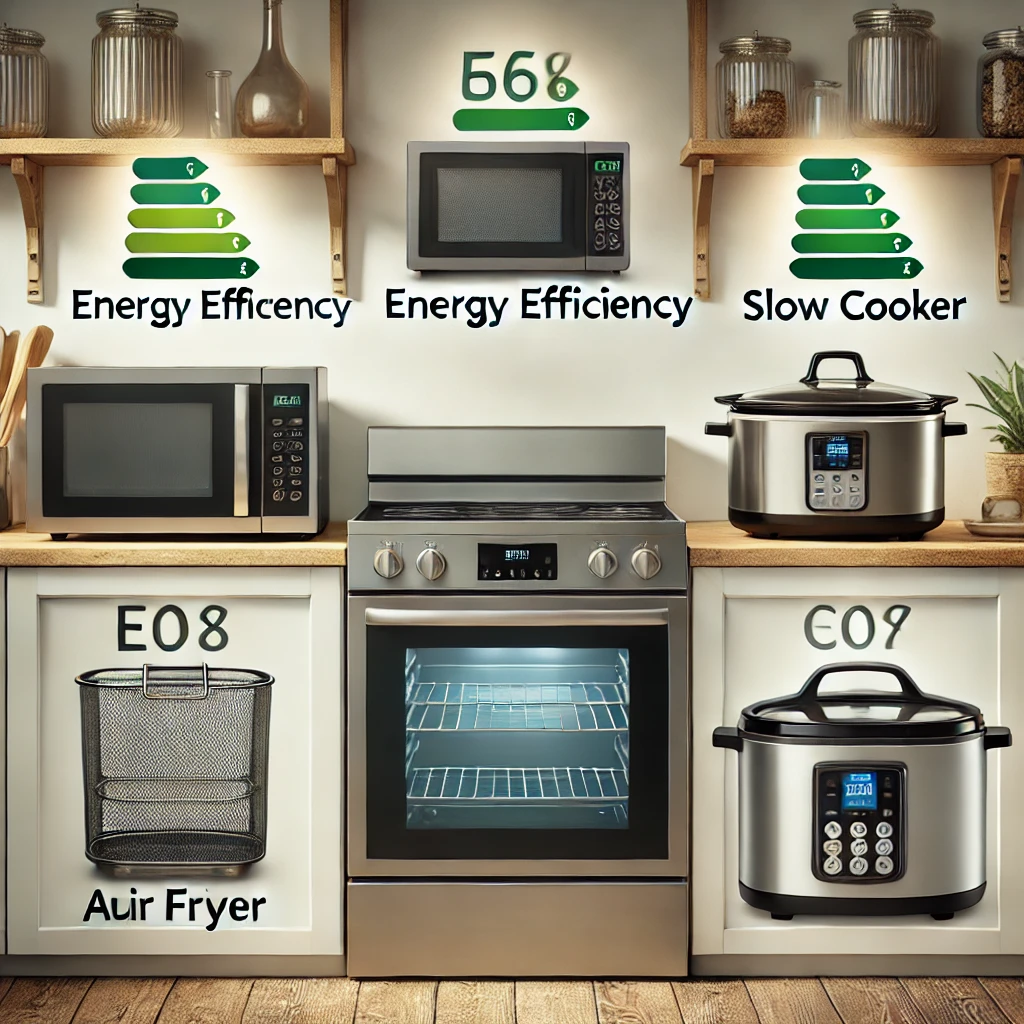
What’s The Cheapest Cooking Appliance To Use?
As energy costs rise, many people are rethinking their cooking habits to find the most cost-effective methods. From air fryers and microwaves to ovens and slow cookers, each appliance consumes energy differently. So, which cooking appliance is the cheapest to use? Let’s break down the energy consumption of popular appliances and determine the most budget-friendly options for everyday cooking.
1. Energy Consumption of Popular Appliances
To understand which appliance is cheapest to use, we need to consider their average power usage, cooking time, and energy rates.
Microwave
- Power Usage: 600–1,200 watts (0.6–1.2 kW)
- Cooking Time: 2–10 minutes for most tasks
- Cost Per Use: Approximately £0.01–£0.06
- Best For: Reheating, defrosting, small portions, quick meals
Air Fryer
- Power Usage: 1,200–2,000 watts (1.2–2 kW)
- Cooking Time: 10–30 minutes
- Cost Per Use: Approximately £0.06–£0.20
- Best For: Crispy snacks, roasting small portions
Slow Cooker
- Power Usage: 200–300 watts (0.2–0.3 kW)
- Cooking Time: 4–8 hours
- Cost Per Use: Approximately £0.15–£0.24
- Best For: Soups, stews, batch cooking, energy-efficient long cooking
Electric Oven
- Power Usage: 2,000–5,000 watts (2–5 kW)
- Cooking Time: 30 minutes–2 hours
- Cost Per Use: Approximately £0.30–£1.50
- Best For: Baking, roasting large meals, batch cooking
Gas Oven
- Power Usage: 10,000–15,000 BTUs per hour
- Cooking Time: 30 minutes–2 hours
- Cost Per Use: Approximately £0.15–£0.60 (depending on gas rates)
- Best For: Baking, roasting large meals, batch cooking
Induction Hob
- Power Usage: 1,200–3,000 watts (1.2–3 kW)
- Cooking Time: 5–30 minutes
- Cost Per Use: Approximately £0.06–£0.45
- Best For: Fast and precise cooking, boiling, frying
2. Factors Affecting Cost Efficiency
While raw energy consumption gives us an idea of costs, other factors influence which appliance is the most economical:
Cooking Time
Shorter cooking times generally translate to lower energy costs. Appliances like microwaves and air fryers excel here, as they cook quickly.
Portion Size
For small meals, using a smaller appliance like an air fryer or microwave is more cost-effective. Larger meals are better suited to ovens or slow cookers.
Frequency of Use
Frequent use of high-energy appliances can add up. Switching to more efficient devices for daily tasks, like reheating or quick cooking, can save money.
3. The Most Cost-Effective Appliances for Specific Tasks
Reheating and Defrosting
- Winner: Microwave
- Why: Microwaves heat food quickly and efficiently, consuming very little energy.
Crisping and Frying
- Winner: Air Fryer
- Why: Air fryers use less energy than ovens to create crispy textures in a short time.
Cooking Small Portions
- Winner: Microwave or Air Fryer
- Why: Both appliances are ideal for small portions, with microwaves excelling in speed and air fryers offering better texture.
Cooking Large Meals
- Winner: Gas Oven
- Why: Gas ovens are more economical for larger meals compared to electric ovens, especially for long cooking times.
Slow Cooking
- Winner: Slow Cooker
- Why: Despite long cooking times, slow cookers use minimal energy and are perfect for preparing hearty meals.
4. Tips to Reduce Energy Costs While Cooking
Regardless of the appliance, these tips can help you save money:
- Cook in Batches: Prepare multiple portions at once to maximise energy efficiency.
- Use the Right Appliance for the Task: Avoid using an oven for small tasks like reheating.
- Turn Off Early: Switch off appliances like ovens and hobs a few minutes before the end of cooking time to use residual heat.
- Keep Appliances Clean: A clean microwave, air fryer, or oven performs more efficiently.
- Choose Energy-Efficient Models: Look for appliances with high energy ratings to reduce consumption.
5. Conclusion: The Cheapest Appliance Overall
For most quick and small-scale cooking tasks, the microwave is the cheapest appliance to use, thanks to its low power consumption and short cooking times. For crispy foods, the air fryer is more energy-efficient than an oven. If you’re preparing large meals or baking, a gas oven is typically more economical than an electric oven. And for long, slow cooking, the slow cooker shines as a cost-effective option.
Choosing the right appliance for your needs can save you money on energy bills without compromising on delicious results.

